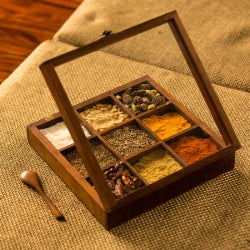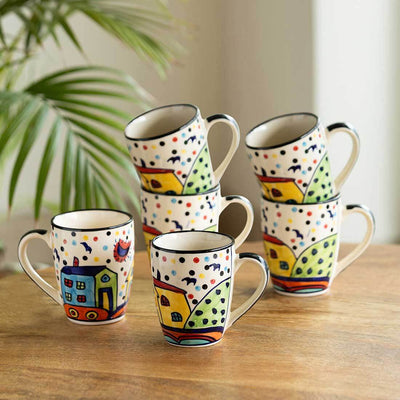Madhubani Painting - The fantastic history of Mithila Painting
India is one country that houses the widest variety of cultures and traditions under one roof. No other country can beat the vast diversity in culture that every nook and corner of the country humbly provides shelter. From festivals to cuisines, every element of every culture is celebrated with great respect and enthusiasm every day. One of the key parts of the rich cultural heritage of this beautiful country is the different forms that originated in this territory and are still actively performed with the same zeal.
Madhubani paintings are an integral part of our rich culture, and it is one of the most popular arts of India. Read further to explore the various wonders of this marvellous type of painting!

What is Madhubani Painting?
Madhubani paintings are one of the most well-known styles of Indian art, and they have long been a part of the culture. Since it is commonly performed in the Mithila regions of Bihar and Nepal, it is also referred to as Mithila art or Madhubani art on occasion. When looking at a Madhubani painting, one can often note complex geometrical patterns that give the piece a distinct look and enhance the beauty of the work. These paintings are well-known for portraying ceremonial material for unique occasions, such as religious ceremonies, festivals, and other celebrations.
It's also worth noting that the vivid colours used in these beautiful paintings are derived from natural sources like plants. Another unique feature of the Madhubani paintings is that the natural colours are applied using twigs, matchsticks, and even fingers’ help. The colours used are usually dark and bright pigments like lampblack (derived from coal) and ochre (a vibrant yellow tint).

Madhubani Paintings History
Everyone is aware of the fact that Madhubani paintings on canvas are pretty famous in our Indian culture. It is safe to say that to date they are one of the most celebrated forms of painting. One can find some of the initial references to this beautiful art form in Hindu epics like Ramayana- when King Janaka, father of goddess Sita, asked the best painters in his kingdom to create a Madhubani painting history for his beloved daughter’s wedding. One instance of the physical passing down of the knowledge about this marvellous art form from one generation to another, which ultimately led to these paintings becoming a preferred choice of art in every household in the region. Later on, various historical scriptures and artefacts stand as evidence to the fact that women of the village started practising these paintings on the walls of their home to illustrate their thoughts, dreams, and hopes.

Madhubani or Mithila paintings have developed into an essential part of festivals and special events, such as weddings, over time. This art form gradually started to attract art connoisseurs due to many contemporary Indian artists giving it the international attention it deserved. Handmade paper and cloth have taken the place of the traditional plastered mud wall base.
What are the Styles and Designs of Madhubani painting?
Since different sects initially practised Madhubani or Madhubani paintings online, they were categorised into five basic styles: Tantrik, Kohbar, Bharni, Godna, and Katchni. With smooth, flowing marrow like lines or cross hatchings to emphasize the sensuous beauty of the figures, big eyes with curiously shining black pupils gaze cheerfully at the viewers. Madhubani and Mithila paintings are distinct among other Indian folk and tribal traditions because of the extensive use of blue, green, pink, orange, and red colors as well as images culled from myths, folklore, rituals, and contemporary events. It is believed that this style originated in North Bihar, in a village named Madhuban, in the Mithila region.
Today, the above mentioned five different styles have been graciously merged by contemporary artists to produce well-liked results globally. The themes are usually encaptured around the popular Hindu deities like Durga, Krishna, Lakshmi, Rama, Saraswati, and Shiva. Not just this, at times you might come across heavenly bodies like Sun and Moon forming the centrepiece of these beautiful paintings too. One may also witness Madhubani paintings based on the scenes of the royal courts and social events, like weddings. One thing common between all is the use of geometrical patterns that is pretty apparent on first look. These complex mathematical patterns were accommodated into these beautiful traditional Madhubani paintings, which makes them even more intriguing and memorable to look at.

Further, these paintings are often praised for their simplicity too. Since the brush and colours used for curating these masterpieces are usually derived from natural resources, it adds to the charm of these breathtaking paintings. While these paintings are used mainly with the help of powdered rice, and colours derived from natural ingredients like turmeric, indigo, pollen, pigments, flowers, sandalwood, and leaves of plants and trees, on various instances genuine instances are combined to obtain the desired colours too.
Madhubani Paintings today
In today’s date, Madhubani history paintings are not just restricted to the clay walls or other artefacts but also grace the surfaces of various home decor items and accessories. Since Madhubani paintings give the urban yet hip look to any object, they are quite often the preferred choice of the art form on various occasions, especially while decorating one’s home or office. Also, they make excellent gifts on numerous occasions. One can’t resist these bright and simplistic paintings, and so they are often the safe choice for deciding on a gift for friends or family. Across the globe, Madhubani paintings are admired today. Museums like the Arts and Crafts Museum in New Delhi, the Chandradhari Mithila Museum in Darbhanga, the Museum of Sacred Art in Belgium, the Mithila Museum in Japan, and the Museum of Norway hold large collections of Madhubani paintings. Apart from that, many contemporary artists practice Madhubani style painting as part of their experimentation with visual linguistics, as well as for pure pleasure. The simplicity and liveliness of Madhubani paintings appeal equally to scholars as well as avid art collectors, ethnic art promoters as well as laymen with hardly any exposure to fine arts nuances.

Where to buy the best Madhubani Painting Products?
The vital thing to take care of while going out on a hunt for Madhubani Art products is buying them from a trusted source. These paintings are going to safeguard the sanctity of your living space and further beautify it.
Head over to ExclusiveLane handicraft store today and explore the impressive collection of unique Madhubani Art paintings that they have to offer! Check out the beautiful Madhubani Art home decor items and different crafts of India and get your favourite from the various vase designs or wall hangings delivered to your doorsteps. Being home your piece of Madhubani Art and bask in its glory!
Read More
Mughal Era Through The Lens of Art and Paintings






Hi…thank you for such a beautiful article…I love buying hand-made art…I found this great website that sells hand-made & hand-painted products…I recently bought this…I’ll drop the link here for reference.
https://gifts.penkraft.in/
https://www.mystore.in/en/seller/58e0b914c565a67d7153577beee645c3
Thanks For such an Amazing blog about such art forms also if anybody is interested in training or learning such art forms then you can click on this click https://online.penkraft.in/LiveCourseDetail/Kalighat
Very Well Written about thanks for sharing such useful
you can check out our website for an online course on such information
https://online.penkraft.in/OnlineCourseDetail/LippanArtAdvanced
Thanks for Sharing
https://youtube.com/shorts/FxgadFtQJ-M?feature=share
beauty of madubani no can match Well, this is something new I can relate to old things, and it interesting it’s about footwear well I find many struggles with the facts of Lippon art. you can contact us at
Leave a comment